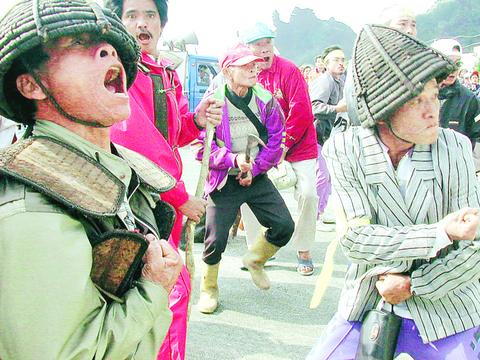Some 300 Tao aborigines staged a protest yesterday at an interim nuclear repository on Orchid Island to press the government to relocate the radioactive waste from their home as soon as possible.
The demonstrators demanded that the government declare that the state-owned Taiwan Power Company's (Taipower) use of the nuclear dump after New Year's Eve is illegal and set a definite time frame for removal of the waste.

PHOTO: LI KUANG-PIN, TAIPEI TIMES
The demonstrators said that if the government fails to respond to their demand within 15 days, they will launch an even larger protest. They ended their demonstration after planting several taro plants at the site to symbolize their claim to the land.
The Tao tribesmen began to converge on the Taipower nuclear dump on Lanyu, located some 42km off Taiwan's southeast coast, early in the morning. While tribal elders wore traditional Tao attire, including silver helmets and long spears, younger Tao people carried posters that read: "Oust nuclear waste! Oppose relocation of residents."
More than 200 policemen were mobilized to maintain order. At one point, some demonstrators threw stones at the policemen, but the clash was soon stopped when Tao elders assisted in controlling the situation.
At present, 97,672 barrels of low-grade radioactive waste from Taipower's three nuclear power plants are stored at the Lanyu nuclear dump.
The Tao demanded that President Chen Shui-bian (陳水扁) honor his campaign promise to relocate the waste during his presidency, which will end May 20, 2004. In recent years, the Tao have staged many large demonstrations to push for prompt removal of the waste.
The Cabinet passed a draft bill last month that outlines legal proceedings to ensure professionalism and information transparency when choosing permanent nuclear dump sites for domestic low-grade radioactive waste. The bill is now awaiting approval of the Legislative Yuan.
Premier Yu Shyi-kun said in mid-December that the government will eventually relocate the nuclear waste, but he added that the government needs to extend the interim land lease with a Tao association until it can find a new location.
Tao tribesmen demanded that certain provisions believed to hinder relocation be revised. Moreover, they are opposed to any extension of the lease contract, which was signed between Taipower and the Tao association in 1982 and will expire by the end of this year.
The demonstrators also de-manded that the government form a high-level negotiation team to discuss the relocation issue with their representatives.

US President Donald Trump said "it’s up to" Chinese President Xi Jinping (習近平) what China does on Taiwan, but that he would be "very unhappy" with a change in the "status quo," the New York Times said in an interview published yesterday. Xi "considers it to be a part of China, and that’s up to him what he’s going to be doing," Trump told the newspaper on Wednesday. "But I’ve expressed to him that I would be very unhappy if he did that, and I don’t think he’ll do that," he added. "I hope he doesn’t do that." Trump made the comments in

A cold surge advisory was today issued for 18 cities and counties across Taiwan, with temperatures of below 10°C forecast during the day and into tonight, the Central Weather Administration (CWA) said. New Taipei City, Taipei, Taoyuan and Hsinchu, Miaoli and Yilan counties are expected to experience sustained temperatures of 10°C or lower, the CWA said. Temperatures are likely to temporarily drop below 10°C in most other areas, except Taitung, Pingtung, Penghu and Lienchiang (Matsu) counties, CWA data showed. The cold weather is being caused by a strong continental cold air mass, combined with radiative cooling, a process in which heat escapes from

Tourism in Kenting fell to a historic low for the second consecutive year last year, impacting hotels and other local businesses that rely on a steady stream of domestic tourists, the latest data showed. A total of 2.139 million tourists visited Kenting last year, down slightly from 2.14 million in 2024, the data showed. The number of tourists who visited the national park on the Hengchun Peninsula peaked in 2015 at 8.37 million people. That number has been below 2.2 million for two years, although there was a spike in October last year due to multiple long weekends. The occupancy rate for hotels

Snow this morning fell on Alishan for the first time in seven years, as a strong continental cold air mass sent temperatures plunging across Taiwan, the Central Weather Administration (CWA) said. The Alishan weather station, located at an elevation of about 2,200m in central Taiwan, recorded snowfall from 8:55am to 9:15am, when the temperature dropped to about 1°C, the CWA said. With increased moisture and low temperatures in the high-altitude Alishan area, the conditions were favorable for snow, CWA forecaster Tsai Yi-chi (蔡伊其) said. The last time snow fell at the Alishan weather station was on Jan. 10, 2018, while graupel fell there